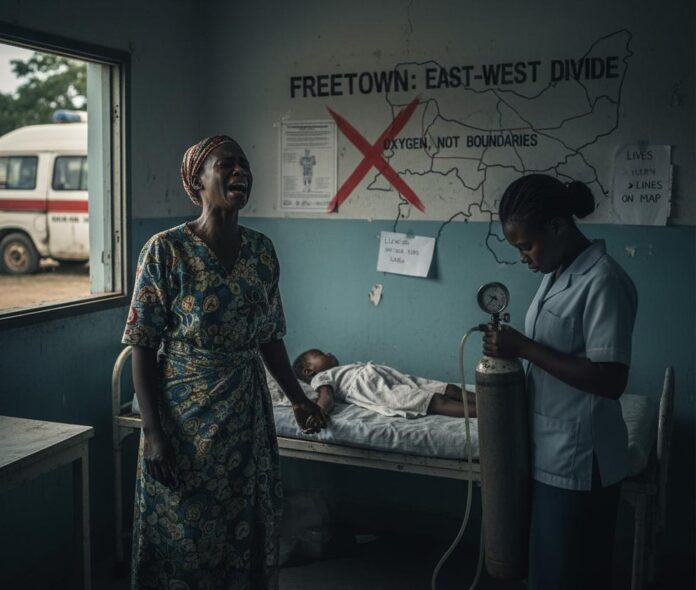By James Tamba Lebbie
Mariatu Sesay was seven when her lungs began to fail. Pneumonia, the doctor said, a disease that should have been treated easily. Her mother clutched her hand as they waited for the hospital’s single oxygen tank to be wheeled in. But when the nurse returned, she whispered the words that still haunt the ward: “It is finished.”
No backup tank. No functioning ambulance to transfer her. No portable ventilator. Within the hour, Mariatu’s small chest rose for the last time. Her mother’s cry cracked through the corridors, another reminder that in Sierra Leone, the absence of basic medical equipment is not an exception—it is the rule.
And yet, in the middle of this crisis, the government says the solution is to divide Freetown into two cities.
This is political theatre at its worst. Officials argue that splitting the capital will improve “service delivery.” But what service was denied Mariatu? Oxygen does not flow from city boundaries. Ambulances are not dispatched by new council names. Health workers are not hired because of a redrawn map. Sierra Leone’s health system is managed centrally, funded centrally, and too often—fails centrally.
If decentralisation is to mean anything, it must be real. It must put resources where lives depend on them:
- Budgets for equipment and medicines,
- Authority to hire doctors and nurses,
- Emergency systems that guarantee every hospital has working ambulances and trained staff.
Instead, what the government offers is a cartographer’s distraction: lines on a map, cosmetic changes, political engineering dressed up as reform. Every headline about “two cities” pushes aside the real emergencies—the children gasping for air, the mothers bleeding in delivery wards, the men dying from injuries that could be treated with basic tools.
Mariatu’s story is not isolated. It is a mirror for thousands of families across Sierra Leone who know the agony of losing loved ones, not because the illness was too advanced, but because the system was too weak.
Citizens must demand honesty: will dividing Freetown save a child’s life, or will it only redraw a political map? Until that question is answered, no consultation, no meeting, no decree can be called legitimate.
In Mariatu’s name, and in the name of all those gone too soon, Sierra Leoneans must speak with clarity: oxygen, not boundaries; ambulances, not divisions; real services, not illusions.




